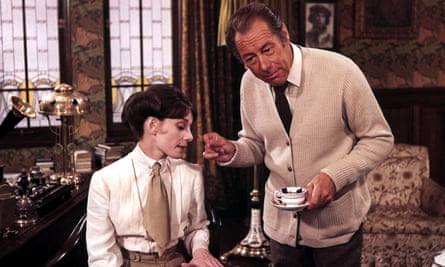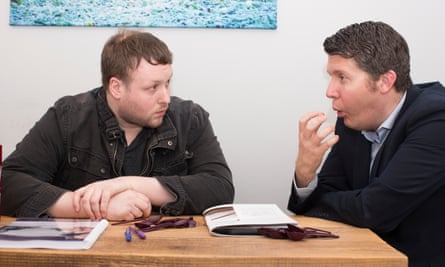‘I feel that this award was not made to me as a man, but to my work – a life’s work in the agony and sweat of the human spirit, not for glory and least of all for profit, but to create out of the materials of the human spirit something which did not exist before.” As I read this extract – from William Faulkner’s Nobel prize acceptance speech – I hand a plastic spoon to my voice coach every time I arrive at an important word.
I am in central London, attending an “accent softening taster session” with the London Speech Workshop. Jamie Chapman, the Henry Higgins to my Eliza Doolittle, tells me that I begin my sentences with lots of energy but they fall flat at the end. He claims that passing the spoons will help me “land” my thoughts: “You have to imagine that, every time you speak, you have put something inside your listener’s hand,” he says.
I visit Chapman because, since I moved from Manchester to London two years ago, I have been mocked about my accent, which made me think about softening some of my rougher edges. Regional accents not only indicate where we are from, but can reveal our social class, while a recent study found that broad regional accents can be a barrier to social mobility.
The idea of erasing part of my identity makes me profoundly uneasy, nevertheless, it is something that many people are trying. Superprof, an online tutoring database, has 2,868 online elocution tutors offering one-to-one lessons, and the Tutor Pages, a tutor business directory, reported that, in the three months following 2016’s EU referendum, inquiries for elocution lessons increased by more than 23.5%, compared with the same period in 2015. In the past, elocution teachers offered their clients the ability to speak “correctly” or with “distinction”. Today, businesses – possibly aware of the class connotations – promote their services with more euphemistic words; it’s now about “softening” your accent not changing it and speaking “clearly”, not correctly.
Yet underpinning this are the same old assumptions, says Dr Sol Gamsu, an assistant professor of sociology at Durham University. “Accents are tied into uneven regional geographies of economic and cultural power,” he says. “The associations between intelligence and forms of middle-class and elite speech and accent are deeply woven into British class structures.”

A broad regional accent might hold you in good stead in some jobs, but can be a drawback in more upwardly mobile careers. “There may be some kind of expectation that, if you’ve secured a good degree and aced teacher training, then why didn’t you modify your accent as a linguistic means to signal that you are moving up in the world,” says Dr Alex Baratta, a lecturer at the Manchester Institute of Education.
“Accents tell you as much about what we project on to people as anything to do with the actual people,” says Sophie Scott, a professor of cognitive neuroscience at University College London. How you perceive accents can be dependent on your proximity to the location of the accent, she says. She grew up in Blackburn, Lancashire, where the Liverpudlian accent was considered “metropolitan”. This contrasts with the animus that some Mancunians have towards a scouse accent, and the romanticism some Americans hear in its cadences.
Since I have been in London, I have become conscious of what my accent signals – northerners are often depicted as being louts or simpletons in the southern-centric media. During the first few ice-breakers at university, I was told by a well-spoken southerner that I sounded like Karl Pilkington, of An Idiot Abroad fame.
And if it’s not Pilkington representing Manchester, it’s Shameless’s Frank Gallagher or Diane Morgan’s adorable dimwit, Philomena Cunk.
This stigma concerned Sarah Byrne, 29, when she began her acting career. Byrne, who played Meena Karib on Shameless and now runs her own acting agency, is from Oldham, Greater Manchester. “I always thought, when I was going for certain parts, that having a northern accent might hinder my chances,” she says. “When I was 19 or 20, I tried to change my accent a little. I just felt like people would take me more seriously if I spoke better.” As Byrne got older, she embraced it instead. “I’m proud of where I’m from and if that shows through the way I speak, then so be it.”
Of course, it’s not just northerners. Kirsty-Lee Griffiths, 29, founder of the healthy-eating fast food company Macro Food, is from Walsall, West Midlands. When she moved to Manchester she, too, tried to soften her accent. “It was something I was really self-conscious about because people think that people with a Birmingham accent are quite stupid,” she says. Jess Phillips, Labour MP for Birmingham Yardley, however, considers her Brummie accent one of her “greatest assets”, but has experienced some of what worried Griffiths. “Outside of parliament, people definitely will use it as a tool to have a go at you,” she says. “They’ll say you sound thick and you’re common and you don’t speak properly.”
The way Phillips writes has also been ridiculed. “Every single time I write anything down about being a mom, or about my mom or other moms – I write it: ‘Mom,’ because that’s how we say it in Birmingham. And every single time someone will be like: ‘Oh, that’s not how you spell it. It’s mum. You’re thick.’ I’m like: ‘Not where I live it isn’t’,” Phillips adds.
While people may be worried about regional accents, others claim that sounding too posh can be frowned upon. The former head of Harrow recently complained of former pupils using “mockney” accents. The Queen’s English, or received pronunciation (RP), was considered the brogue of the elite for a long time; it was adopted by the BBC and for decades no one was allowed on the airwaves who veered too far from it. Today, it’s no longer a requisite to social mobility.
In the introduction to my taster session, Chapman tells me several times he “loves accents” and “wouldn’t do what he’s doing” if he didn’t. I feel conflicted, however, because even though I have no reason to doubt Chapman, he is still a voice coach providing “accent softening” courses, something that another voice coach, Matt Pocock, told the Guardian was like “a Band Aid on a class system that isn’t working”.
Yet often it is not the accent that is the problem, says Chapman. “An employer might send somebody for accent softening, and actually what they mean is that the employee’s voice doesn’t quite sound formal.” The difference between sounding formal and informal, he explains, lies in speaking too quickly, mumbling or reductions in speech such as the glottal stop – an abrupt silence that replaces T and, occasionally, other consonants at the end of words. “If you drop a T at the end of a word just before a pause like this: Do you see my poin …? Or: Do you see my poinT? Which of those two sounds like I value it more?” Chapman asks. “It’s the second one, because I’m completing it,” Chapman confirms. “You can have a fairly strong regional accent, but you’re putting in Ts at the end of words. You’re being careful – enunciating clearly. So that’s about being careful with the speech, valuing what you say, not mumbling. That’s distinct, I think, from accent.”
But is it? Baratta argues that those reductions contribute to accents and, in turn, whether people are perceived as “common” or working class. “If you take the word Saturday. I know that people with a neutral accent might say, ‘Sa-tur-day.’ If you say, ‘Sa-di’, it’s gone from three to two syllables and you’re using the glottal stop, which is very stigmatised.”

Other differences, such as TH-fronting, which is pronouncing “th” as “f” or “v”, can affect your employability, says Scott. “The more somebody says ‘munf’ rather than month, ‘fru’ rather than through, we will consider that to be a marker that they are less employable. Because it is perceived to be a measure of socioeconomic status.”
Chapman takes me through the sound diagnostic, a verbal test to check how my speech varies from RP or standard-neutral English. I read through the phonemic alphabet, a system that allows people to learn how to pronounce English sounds in RP. I begin by pronouncing words with vowels of the long and short variety, then diphthongs, before moving on to consonants, including plosives and fricatives. I read through lines consisting of one or three words such as “apple, cat, sag,” or “earth, murder, learner”. When Chapman wants to clarify a sound – at least that is what I think he was doing – I repeat phrases such as: “I’m singing a song for spring” and “lovely monkey” several times, which makes me crack up; it’s as though I am in My Fair Lady. The verdict is that my accent gets particularly Manc when I am pronouncing long vowels. When I make an “O” sound, Chapman says my lips “don’t come forward and round enough”. I have got my work cut out for me if I ever want to present on Radio 4.
Should I start practising? Dawn-Marie France, the editor of Yorkshire Women’s Life, says that, as a young Carribean-Asian and a “working-class girl living in Yorkshire”, she was often told she would never make it as a broadcaster because of her accent. “But because I’m quite a gutsy northern lass I thought: ‘No, I want people to accept me for who I am.’ I was determined to not give way to any kind of prejudice,” she adds.
Can we change society, so that people like France aren’t told they have to change themselves? Phillips says that having more people with regional accents in powerful positions would help. And she suggests having more TV presenters with regional accents to “walk around art galleries” talking about “clever stuff” such as history would be a good place to start to “change the way people view who is clever and who isn’t”.
I am convinced. I am a northerner and if any daft apeth with a cob on wants to mither me about my accent, they can do one. It’s their problem, not mine.
